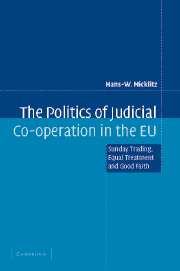Book contents
- Frontmatter
- Contents
- List of figures
- List of tables
- Preface and acknowledgments
- Table of cases
- Table of treaties
- Table of EC directives
- Table of statutes
- Table of statutory instruments
- List of abbreviations
- 1 Judicial activism and legal politics
- 2 The reconstruction of the Sunday trading cases
- 3 The reconstruction of the equal treatment litigation
- 4 The reconstruction of good faith in the control of unfair terms in consumer contracts
- 5 The limits of judicial activism and perspectives for legal politics
- Bibliography
- Index
2 - The reconstruction of the Sunday trading cases
Published online by Cambridge University Press: 06 August 2009
- Frontmatter
- Contents
- List of figures
- List of tables
- Preface and acknowledgments
- Table of cases
- Table of treaties
- Table of EC directives
- Table of statutes
- Table of statutory instruments
- List of abbreviations
- 1 Judicial activism and legal politics
- 2 The reconstruction of the Sunday trading cases
- 3 The reconstruction of the equal treatment litigation
- 4 The reconstruction of good faith in the control of unfair terms in consumer contracts
- 5 The limits of judicial activism and perspectives for legal politics
- Bibliography
- Index
Summary
Article 28: a weapon to win the Sunday trading war?
The Shops Act 1950 dates back to a proposal by the Royal Commission on Shopping Hours. The Commission had been established after the Second World War to consider, amend and consolidate the existing regulations on shopping hours. The Shops Act 1950 constituted a consolidatiom measure which was intended to consolidate all the Acts which had been passed since 1890 relating to shopping hours. Material to the Sunday trading litigation is section 47 of the Shops Act 1950. Twenty years after its enactment, section 47 became the focus of concern to certain retailers in the UK. Section 47 provided as follows:
Every shop shall, save as otherwise provided by this Part of this Act, be closed for the serving of customers on Sunday.
From 1970 onwards, traders realised the extent to which they could increase their profit by trading on Sundays. Consequently, they launched a campaign in Parliament advocating the total deregulation of shopping hours. When this campaign failed, they resorted to more radical means by simply opening their shops on Sundays regardless of section 47. This deliberate flouting of the law was a challenge to local authorities (who were responsible in the UK for enforcing this particular law). The ‘war’ lasted for more than a decade, with various other warriors more or less successfully entering the battlefield. Victory or defeat in the Sunday trading war became dependent on the outcome of the battle in the European courts.
- Type
- Chapter
- Information
- The Politics of Judicial Co-operation in the EUSunday Trading, Equal Treatment and Good Faith, pp. 43 - 164Publisher: Cambridge University PressPrint publication year: 2005



